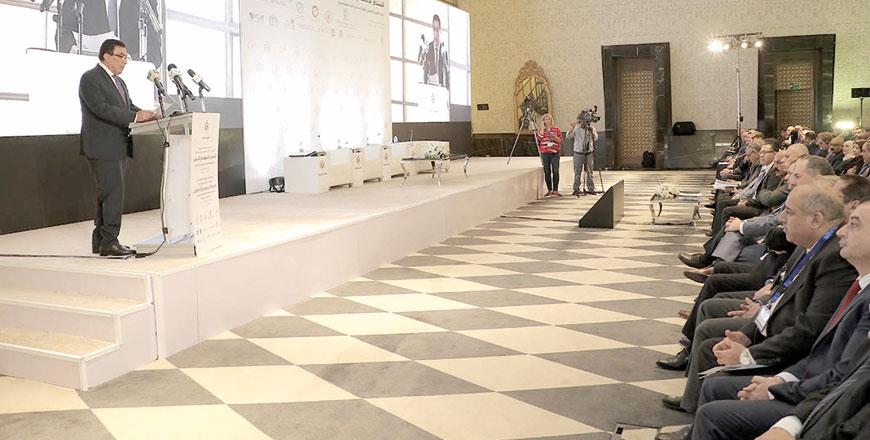You are here
House-organised Jordan Economic Forum opens at Dead Sea
By JT - May 03,2018 - Last updated at May 03,2018

Lower House Speaker Atef Tarawneh addresses Jordan Economic Forum held at the Dead Sea on Wednesday (Petra photo)
AMMAN — Deputising for His Majesty King Abdullah, Lower House Speaker Atef Tarawneh on Wednesday opened the Jordan Economic Forum at the Dead Sea, the Jordan News Agency, Petra, reported.
The forum was organised by the Lower House's economic and investment committee.
The forum discussed four main subjects: Fiscal and investment policies, economic refourms including the Economic Growth Plan, improving the national institutions and human resources and related social issues.
During the opening ceremony, attended by Deputy Prime Minister and Minister of State for Prime Ministry Affairs Jamal Sarayreh, Deputy Prime Minister and Minister of State for Economic Affairs Jafar Hassan and a number of senior officials, Tarawneh stressed the importance of cooperation between the legislative and executive authorities to boost economic growth.
He said that the legislative authority should prioritise drafting law pieces to lay the groundwork to create an attracting investment environment; meanwhile, the executive authority should dedicate all capabilities to remove "obstacles" that would hinder economic activities.
Building a strong economy that is able of generating jobs and improving community's livings requires an active and efficient partnership between the public and the private sector, the speaker said.
Reforming the administrative body of the public sector is a priority that does not tolerate procrastination, Tarawneh said, urging the private sector to adopt promising initiatives that would contribute to curbing poverty and joblessness.
For his part, Hassan said that it is imperative to have solid and resilient financial and fiscal policies, a matter which necessitates a lower debt-to-GDP ratio, which stands now at around 95 per cent. Downsizing public debt is a prerequisite to the success of economic growth stimulation plans, he stressed.
The stimulation plan, he said, requires concerted efforts by all government agencies that should implement blueprints that have been ready for years, blaming lack of progress to “reluctance and [unjustifiable] delays”.
Hassan noted that the stimulation drive entails 97 programmes, 92 corrective measures and 23 investment projects, stressing that self-reliance is among the major goals of the scheme.
Finance Minister Omar Malhas focussed in his remarks on the needed tax reforms, noting that almost half of the draft income tax law addresses tax evasion, improving tax collection and the best use of technology to achieve these goals.
The minister said that a financial investigation department will be established to further help in addressing tax evasion.
On tax revenues, Malhas said that 70 per cent of Treasury revenues are received from indirect taxes, which constitute an inverted pyramid, as public revenues should be generated directly from taxes.
Related Articles
AMMAN — Head of the Lower House's Economy and Investment Committee Khair Abu Saileik on Tuesday said that Jordan will host an international
AMMAN — The Senate’s Finance and Economy Committee on Tuesday held a meeting to discuss the Kingdom’s monetary, investment and financial pol
AMMAN — Lower House Speaker Atef Tarawneh on Monday called on the government to reconsider its economic policy not to affect people’s living














